
|
Childhood & Early Years I was born in Norfolk, England in November 1947 and, while my childhood was not one of privilege, my sister Rose-Marie and I always felt loved and there was plenty of food on the table in our home.
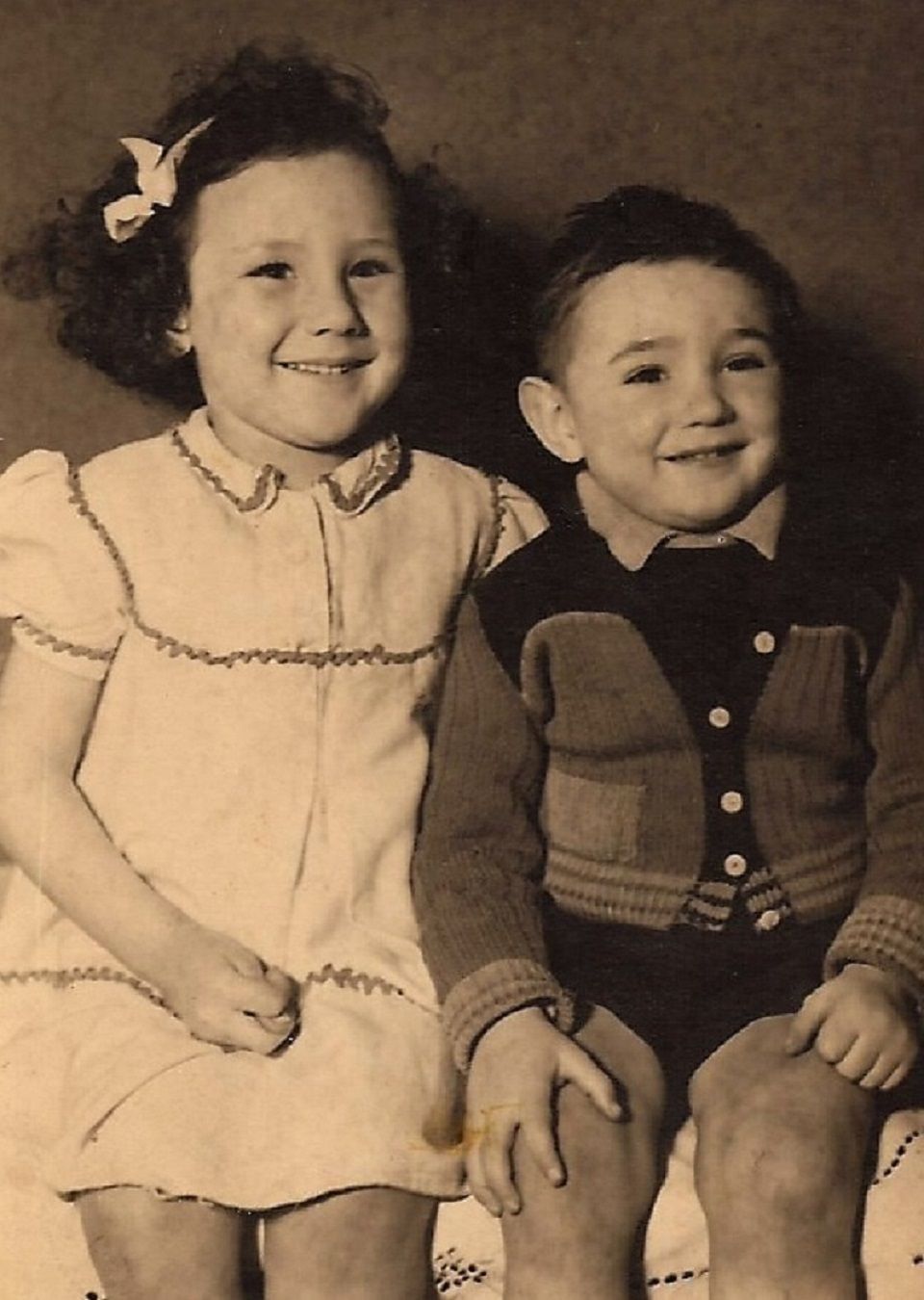 Rose-Marie and me
Home was a farm, where my father was a farm labourer and in my early years, we lived in a tied cottage. My mother, Marie, however, did come from a privileged background. While she was born to working-class parents, when she was nine my grandmother married a very successful engineer who worked in many interesting places around the world. My mother spent her formative years in Argentina, South Africa, and France. She was trilingual, being fluent in English, French, and Spanish. My father Jim, on the other hand, was what we would have called ‘salt of the earth’ - a hardworking man capable of turning his hand to anything. Jim was born in South Wales and prior to meeting my mother, had travelled extensively. He had worked down the mines, had worked his way across to Australia as a stoker on a ship, and had sheared sheep. He had been a lumberjack in Canada and had served with the Canadian army during WWII in France. After the war, he came back to the UK to be joined later by my mother who had given up a secure and comfortable life in France and accepted the few amenities available in the hardworking environment of rural England, all for the sake of love, and to bring up Rose-Marie and me.  Me, Mum and Rose-Marie Life in those days was not easy due to the post-World War II economy in England. Our furniture was homemade, mostly by my dad. Our dining table was an upside-down packing crate. Living on a farm, I developed a strong work ethic from an early age. This involved me going potato and strawberry picking, and beet singling, which was ensuring that no more than one beet plant was growing together. I also went bush beating, which is an essential part of any successful shoot. The beater’s job was to flush the birds up and drive them towards the guns of the shooters. For that, I was paid ten shillings a day and a can of ginger beer. I also learnt a lot about nature and animals, and I learnt how to live off the land. Life on the farm meant that Rose-Marie and I grew up fit and healthy often going around with Dad. As we lived outside the village and didn’t have a car, I walked everywhere. That alone was a great way to keep fit.  Rose-Marie, Dad and me with the cows
I have been lucky enough to have enjoyed good health throughout my life with the exception of the usual childhood illnesses such as chicken pox, measles and whooping cough, and the removal of my tonsils and adenoids. Certain aspects of my childhood I remember well, such as getting dressed under the bedcovers because it was too cold to get out of bed and scraping the ice off the windows to see what the day outside was like. Our home had one source of heat - a coal-burning fireplace in the living room. Every morning, my dad would build a new fire, as it was not kept going overnight. It was my job to keep the coal scuttle in the house topped up. I remember the “coal man” delivering bags of coal, lifting them off the back of his horse-drawn cart and carrying them into the “coal house”, a small shed at the back of the house, where he would empty the bags. While he was doing that, Rose-Marie and I would feed his horse an apple taken from our orchard at the bottom of the garden. An outdoor toilet meant we had to go down the yard and, on a snowy morning, we would put on our Wellington boots and make the trek out the back when we needed to go. If we had to go in the night, there was a chamber pot under the bed. We didn’t have toilet paper; we used squares of newspaper instead. There was a saying ‘Today’s news, is tomorrow’s arse wipe.’ The newspapers were left hanging up on a nail and we crumbled them up before using them, as it made them more comfortable – an early version of deluxe toilet paper! When I consider that living like this was normal for me as a young lad, I was amused by the panic buying of toilet paper when the first wave of the Covid pandemic came in 2020. I once mentioned to the lady who managed our office how we had substituted toilet paper with newspaper, and she couldn’t believe it. She also couldn’t believe that there was no sell-by date on food and that if we found mould on bread or cheese, we would simply cut it out and eat the rest. In her defence, she was considerably younger than me. We did have running water in the house – cold water, that is. When bath time came around, we brought in the tin tub that hung on a hook in the shed, put it in front of the fire, and filled it with water that had been heated on the coal stove in the kitchen. Needless to say, we didn’t bathe every day. I can remember many things from my early years. My cot, my first steps, playing with my sister. I remember the peddle car I had and getting my first bike. We got that from an auction, and I can still recall looking up at my mum with pleading eyes, as the bidding got underway. My dad taught me to ride it and held the back of the saddle until I had got my balance. I remember also looking forward to starting school and skipping along the road on my first day. 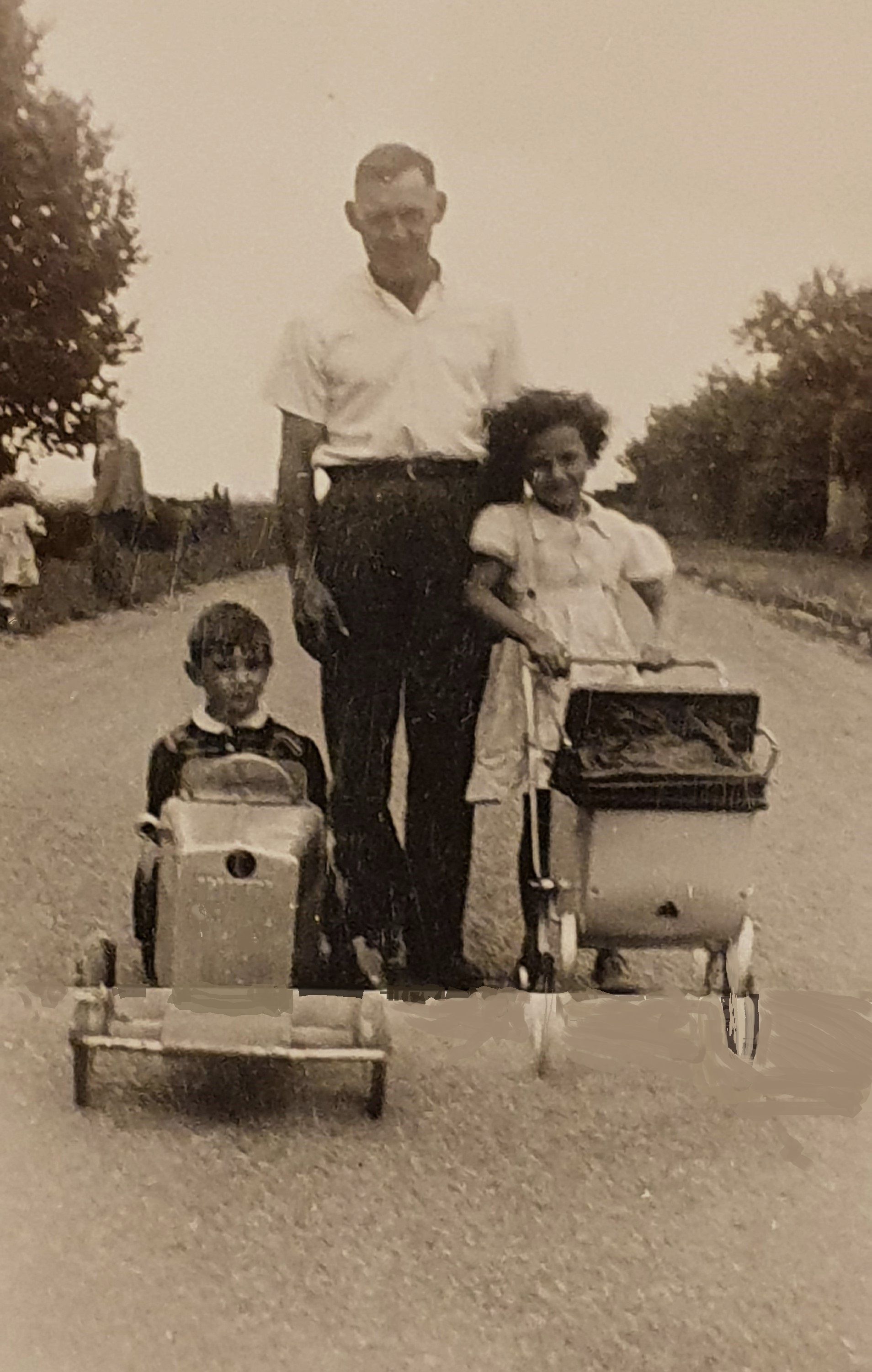 Dad taking us for a walk, me with my peddle car and Rose-Marie with her pram Our pets were a big part of our lives on the farm. We always had cats and I’ve had a cat whenever it’s been possible. At one time Rose-Marie and I each had our own rabbit, and it was our job to look after them. I can’t remember what happened to Rose-Marie’s, but I remember one morning I went to feed mine and it wasn’t there. It turned out that we had eaten it for dinner the previous night. I still can’t face the prospect of eating rabbit.
Travel was part of my life from an early age. Every year my mother would take Rose-Marie and me across to France and we would stay with my grandmother in Lille for two weeks. My mother took us to many historic places, especially when we travelled to France. As we always spent the day in London on the way, we’d visit places such as the Tower of London, Westminster Abbey, and St Paul’s Cathedral, engendering an interest in history and old buildings which was to stay with me all my life. From Lille, we would travel to Paris for another two weeks and stay with ‘Auntie Nanna and Uncle Georges’. They were not really our aunt and uncle. My mother had lived in Paris during the Nazi occupation, and she and her friend Nanette had hidden a Jewish man named Georges. After the war, Nanette and Georges got married. They and his family never forgot what my mother did to help him escape the Nazis, so we were accepted as part of their family. 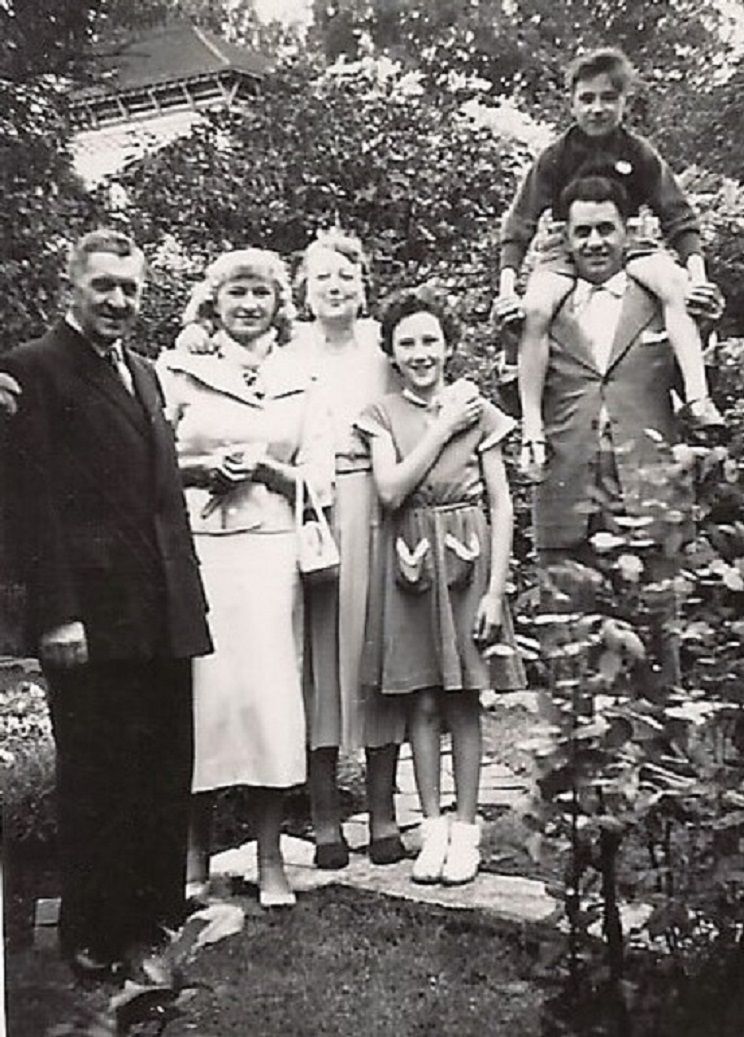 In France -L to R My mother's 2nd stepfather, Nannette, my grandmother, Rose-Marie, Georges and me.
There are many gaps in our understanding of what exactly my mother did during the war. I do know she was part of the Resistance, and after the liberation, she worked with the Allies as an interpreter. It was something she never spoke to us about. 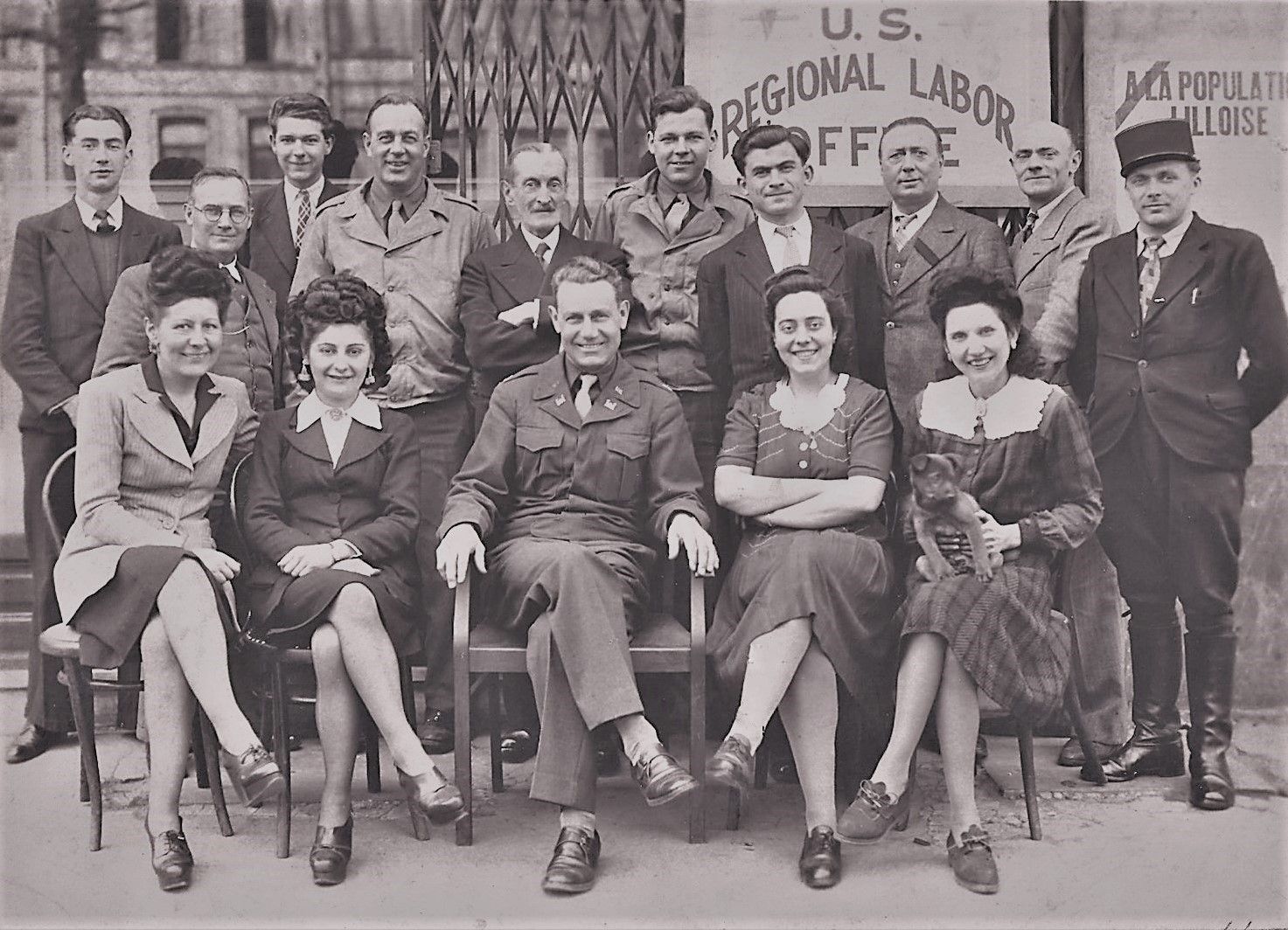 Labour Office - my mother sat on the right with the dog.
Nanette was Rose-Marie’s godmother. Georges became a successful editor for the leading French publications Marie France and Le Parisian. I loved those trips to Lille and Paris and on 20 July 1959, both my sister and I had our First Communion in Bayonne, France, near where Nanette and Georges owned a seaside apartment. When I was seven, my father changed jobs. I had already started school and had been extremely excited about it. We were living at Eye, just outside of Peterborough, having moved there from March in Cambridgeshire, but my dad’s new job was in Auburn near Lincoln. It meant changing schools which upset me at the time because I knew I was going to miss my friends. When we arrived in Lincoln, I moved straight into the Auburn junior school, which was something straight out of a Dicken’s novel. It was a small school with just one classroom for the twenty pupils and one teacher who took us for all subjects. I wasn’t the brightest of children, so he didn’t have much time for me. He had a high desk, which he would get me to stand beside and read. Every time I got a word wrong, he would hit me behind the knees with his cane. I was certainly pleased when he left, and we got a new teacher. The new teacher didn’t last long, and we then had a young guy who I really liked. Having a teacher that I liked changed my whole attitude and I began to work in school for the first time. Unfortunately, that was shortly before I was to change schools, but it did occur to me that I would have had a vastly different experience in my early education if he had been my teacher from the beginning. It was something I carried into my later life when I was to do teaching myself. 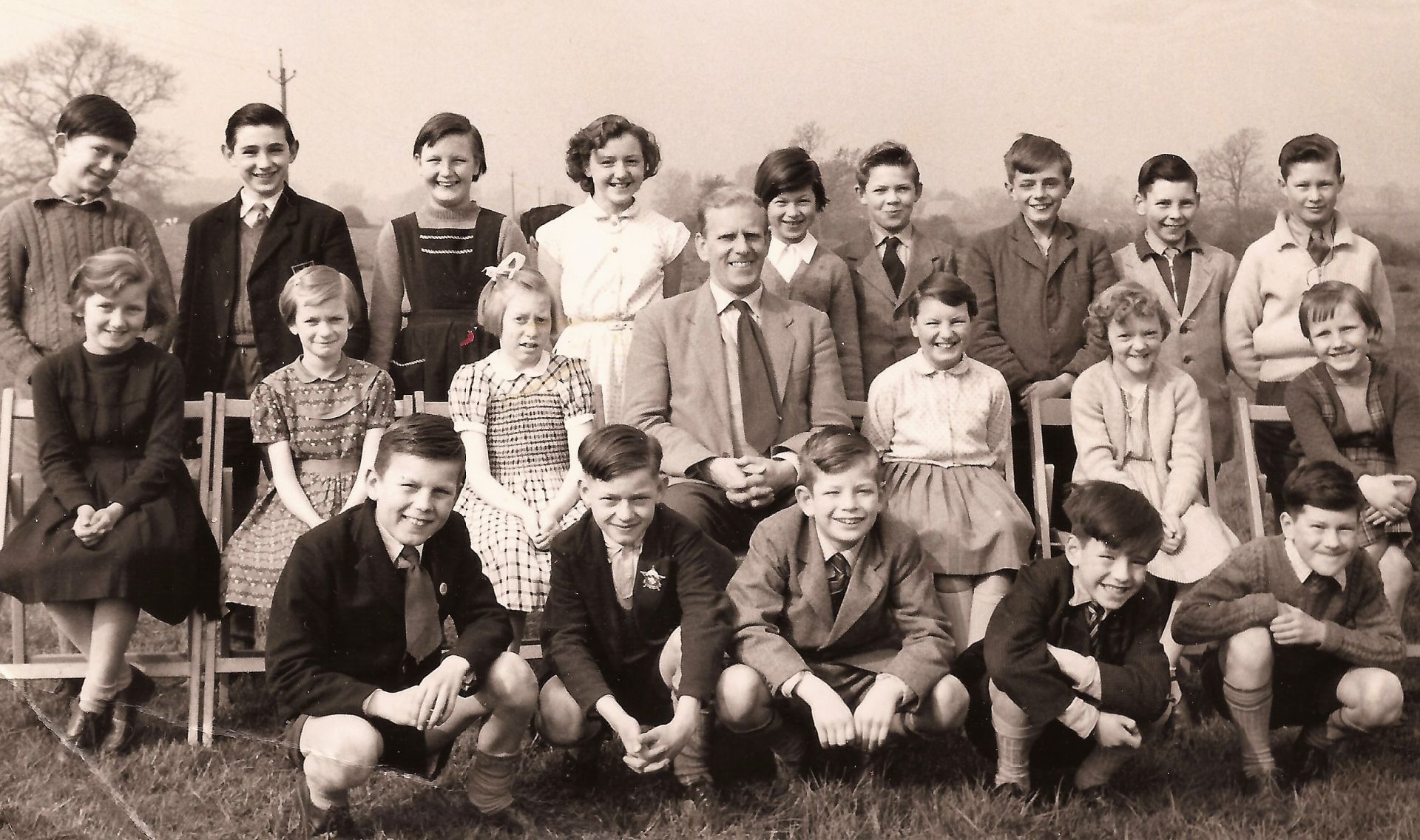 Junior School with the nice teacher. I am standing 2nd from the left.
I failed my 11 Plus, which impacted on which school I would go to, and I ended up at the secondary modern, Robert Pattinson School. Rose-Marie was already attending the school, and some of my junior school mates started there at the same time, so at least I had some friendly faces as I moved into this new environment. My first introduction to military life came at 13 when I joined the Air Training Corps (ATC). My friend Steve Child wanted to join the RAF and being a member of the cadets was a useful stepping stone, not to mention the enjoyment obtained from the organisation. Both Steve and I lived in Washingborough, where I had moved 2 years earlier, this was about four miles from the ATC Training Centre so, having found out when they met, we got on our bikes and biked along. Steve was a very bright and outgoing person, so I didn’t have to do any of the talking. We were invited to tag along for the evening and see if we liked it. We met a couple of other guys, Phil Johnson, who I was to retain contact with, and Pete Burnett, and we all bonded, so at the end of the evening we agreed to meet up again at the next training evening and officially join. The ATC is a national voluntary youth organisation, sponsored by the RAF. Its aim is to provide opportunities for young people between the ages of 13 and 18 to build personal skills and self-confidence in order that they may become responsible citizens. Not only did I learn to march and understand what military life was all about, but I also learnt about being self-sufficient. The ATC was the first time that I went away from home by myself when we went to the cadet's two-week training Summer Camp. Some of the cadets found that quite difficult and a number were homesick. I didn’t have that problem, possibly because of my nature or perhaps it was due to the support that our little group gave each other. 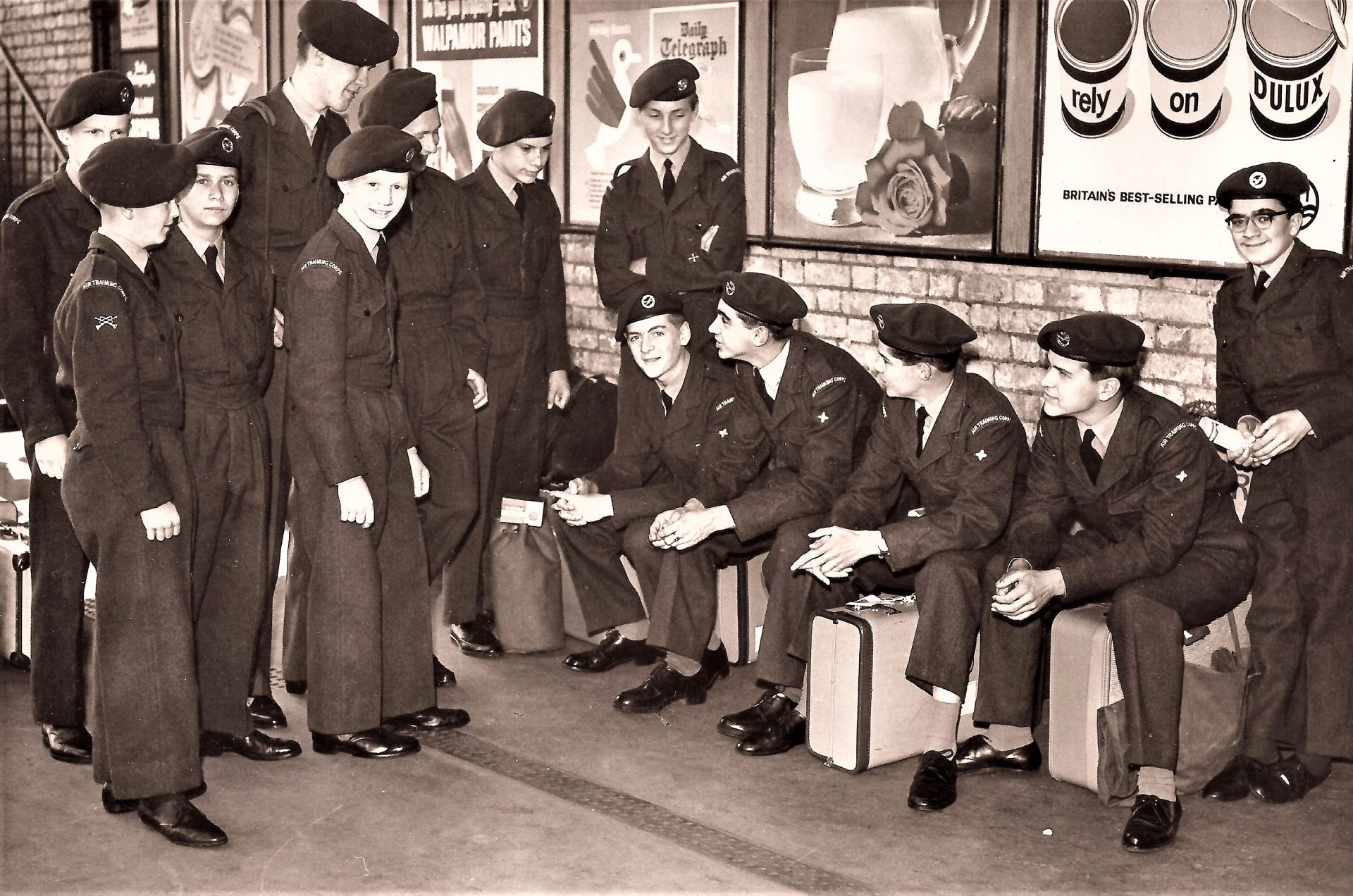 204 Squadron ATC awaiting departure for Summer Camp. Seated on cases L to R: Pete, me, Phil, and Steve.
Meanwhile, back in my secondary school, what I lacked in appetite for academia, I made up for in my passion for sport. I got school colours for athletics and rugby and had a trial for Lincolnshire Under 15 rugby team. I also enjoyed extra curriculum activities, for example, the dancing club, but that was probably because there were more girls there than boys. At the end of each year, the school would stage a play and I was asked if I would participate in that. The play was “I Remember Mama” by John Van Druten, which was about a Norwegian immigrant family in San Francisco early in the 20th century. I played Mr Hyde, the lodger, and I can still remember many of my lines. 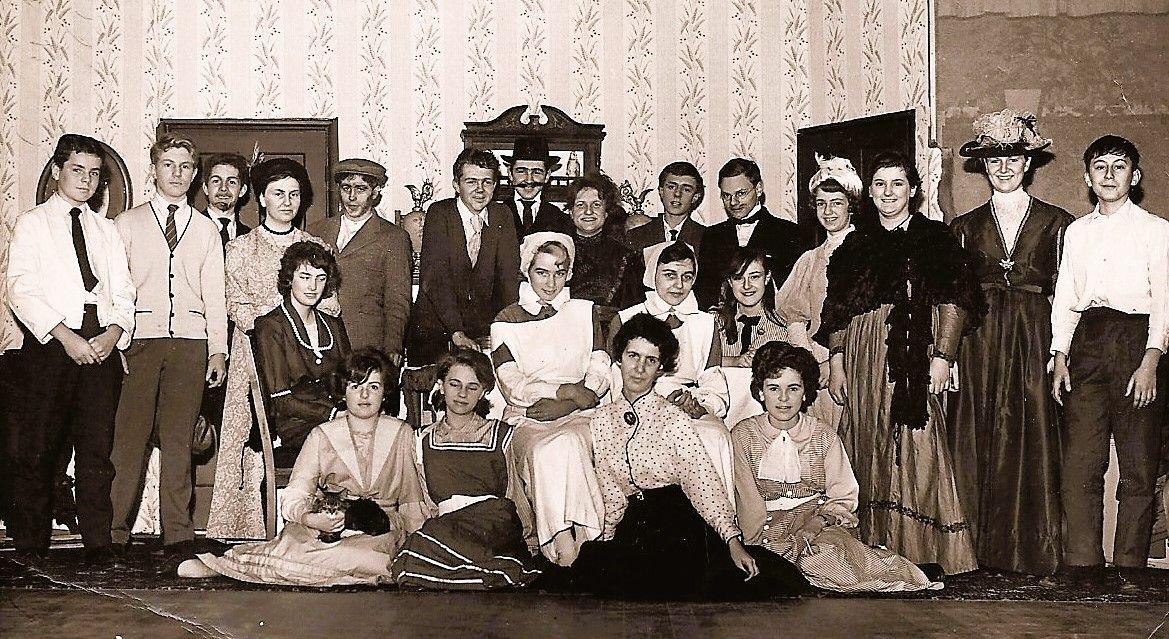 Caste of "I Remember Mama", me centre rear with hat and moustache.
I left school at the age of 15 with no academic qualifications, as the school considered that it would be pointless for me to stay on. My first job after leaving school was putting flower seeds in packets at a horticultural firm called Pennell’s which had shops throughout Lincolnshire. The manager told me that the prospects were good and that everyone started at the bottom and worked their way up if they worked hard and had the aptitude. The only good thing about it as far as I was concerned was the girl that worked in the office. I did get on well with the people though. The guy who took me under his wing was ex-military, he had lost a leg in the war. I liked him and I felt that I could really relate to him. One of my colleagues used to like to have a flutter on the horses and one day he had the certainty that a horse was going to win. He said he would put something on the horse for me. I agreed and gave him sixpence, eagerly awaiting my windfall. The horse limped home in last place. That cured me of any future desire to play the horses, or any other gambling in fact. After a few months of filling seed packets, I was moved downstairs to the shop where I learnt important things like how to sweep a floor and water plants. It quickly occurred to me that I could not envisage myself doing a job like that for the rest of my life and needed to think about a career change. My mother knew the owner of a department store who was looking for someone to work in the furniture department, so I went for an interview. The ability to get on well with people was something I had developed from an early age, so I passed the interview and was offered the job. Unfortunately, I was faced with the same problem in this job too – I simply couldn’t see a future for myself selling furniture. I then went on to sell encyclopaedias door-to-door but clearly didn’t have a flair for that as I didn’t sell any. At one stage I considered that I could work as a guitarist in a pop group. I was playing in a semi-professional group with several friends and, although we were quite popular, we were never going to be super-stars. I played lead guitar and the drummer, Bill Blyth, was to become a tenant of mine many years later when he started his own business. Playing in a group was a great adventure and also taught me many personal skills, which would help me in later life.  Our Pop Group, Bill behind the wheel, me sat next to him.
Shop work, factory work and selling were all out, so now I turned my hand to an apprenticeship. That was one of the great things about my youth: there were so many opportunities available. I found a vacancy as an apprentice electrician at the local job centre. I was sent for an interview and was offered the apprenticeship despite mistakenly calling the boss Mr Bean instead of Mr Beer more than once. I had to start work at 7.30 each morning for which I had to leave home at an ungodly hour, as I travelled to work on my bike. It wasn’t the greatest way to start the day and, since I had my image to consider, I decided to invest in a motorbike. The bike was a 250cc AJS Sports and I had a few lucky escapes. I once misjudged my timing overtaking a parked vehicle when a lorry was coming towards me. I remember thinking I wasn’t going to make it through the gap. I closed my eyes as I waited for the crunch of metal and impending death. Moments passed and I opened my eyes to see I had made it through the gap and was still upright and riding along. My time had not come. 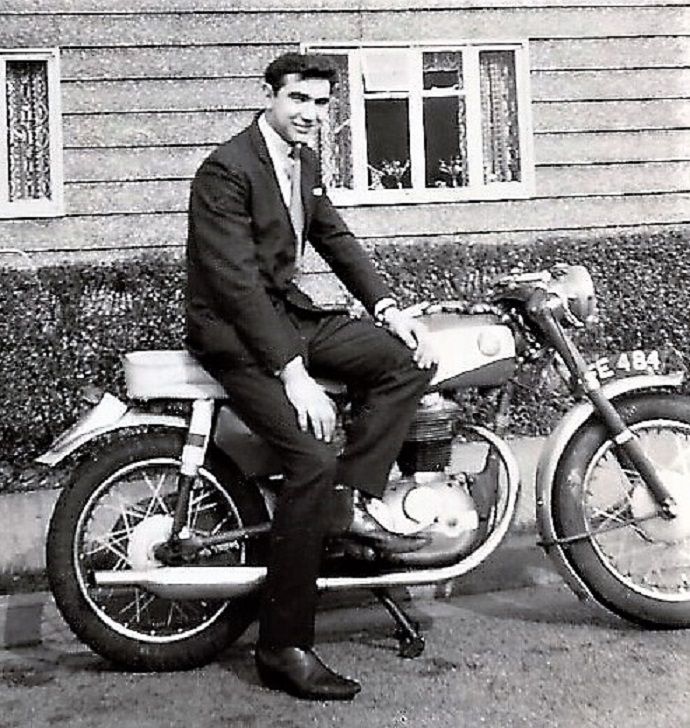 Me with my Motorbike - taken when I was 16 years old.
During my nine months as an apprentice electrician, I worked on new build contracts installing the electrics in a hotel, an educational establishment, and an army drill centre. I also spent time in the workshop making the control panels for a bowling alley. The guy I worked with had a great sense of humour and we got the work done but enjoyed it. A sense of humour is something that my colleagues and bosses have always associated with me. Having a good relationship with people is also key to succeeding at whatever you do. After nine months had passed, I realised that this job was not for me either. I left my electrical apprenticeship behind and secured a job as a porter/handyman at the Golf Hotel, Woodhall Spa, about 20 miles from Lincoln. This was to be my “leaving home” event. I remember thinking as I was riding along on my motorbike to my new job that this was the start of a new chapter in my life. After a few weeks, I was transferred to the restaurant to work as a waiter due to my excellent people skills. It was pleasant and I got by but was soon faced with the same problem I’d faced in every job I’d had so far: I simply could not imagine myself doing this in 40 years’ time. My time in the Air Training Corps had given me a flavour of military life and, with my love for travelling, a career in the military appealed. With that in mind, I began the application process and, at the age of 17, was accepted by the Royal Marines. Chapter 2 - Enlisted in Royal Marines |
|
|
|
|
| Site Map |
